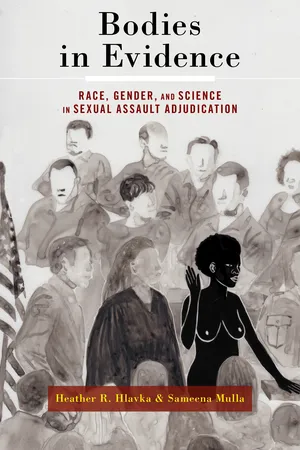
Bodies in Evidence
Race, Gender, and Science in Sexual Assault Adjudication
- English
- ePUB (mobile friendly)
- Available on iOS & Android
Bodies in Evidence
Race, Gender, and Science in Sexual Assault Adjudication
About this book
Winner, 2021-2022 AES Senior Book Prize, awarded by the American Ethnological Society
Honorable Mention, Senior Book Prize of the Association for Feminist Anthropology
Uncovers how the process of sexual assault adjudication reinforces inequality and becomes a public spectacle of violence
For victims in sexual assault cases, trials rarely result in justice. Instead, the courts drag defendants, victims, and their friends and family through a confusing and protracted public spectacle. Along the way, forensic scientists, sexual assault nurse examiners, and police officers provide their insight and expertise, shaping the story that emerges for the judge and jury. These expert narratives intersect with the stories of victims, witnesses, and their communities to reproduce our cultural understandings of sexual violence, but too often this process results in reinscribing racial, gendered, and class inequalities.
Bodies in Evidence draws on observations of over 680 court appearances in Milwaukee County's felony sexual assault courts, as well as interviews with judges, attorneys, forensic scientists, jurors, sexual assault nurse examiners, and victim advocates. It shows how forensic science helps to propagate public misunderstandings of sexual violence by bestowing an aura of authority to race and gender stereotypes and inequalities. Expert testimony reinforces the idea that sexual assault is physically and emotionally recognizable and always leaves material evidence. The court's reliance on the presence of forensic evidence infuses these very familiar stereotypes and myths about sexual assault with new scientific authority.
Powerful, unflinching, and at times heartbreaking, Bodies in Evidence reveals the human cost of sexual assault adjudication, and the social cost we all bear when investing in forms of justice that reproduce inequality and racial injustice.
Frequently asked questions
- Essential is ideal for learners and professionals who enjoy exploring a wide range of subjects. Access the Essential Library with 800,000+ trusted titles and best-sellers across business, personal growth, and the humanities. Includes unlimited reading time and Standard Read Aloud voice.
- Complete: Perfect for advanced learners and researchers needing full, unrestricted access. Unlock 1.4M+ books across hundreds of subjects, including academic and specialized titles. The Complete Plan also includes advanced features like Premium Read Aloud and Research Assistant.
Please note we cannot support devices running on iOS 13 and Android 7 or earlier. Learn more about using the app.
Information
Table of contents
- Cover
- Title Page
- Copyright Page
- Dedication
- Contents
- Introduction: Imagining and Witnessing Sexual Assault Adjudication
- 1. Common Sense and the Nomos of Sexual Assault: Selecting and Sensitizing Jurors
- 2. Permission to Speak: Testimony and the Spectacle of Suffering
- 3. The Low and the High: Presumption, Power, and Police Expertise
- 4. Nursing Sexual Violence from the Stand: Victimized and Victimizing Bodies
- 5. The Evidence Does Not Speak for Itself: Performing Forensic Expertise
- 6. The Good Father: Masculinity, Fatherhood, and Scenes of Admonishment
- Conclusion: Race, Place, and Subjugation in the Courts
- Acknowledgments
- Notes
- Bibliography
- Index
- About the Authors